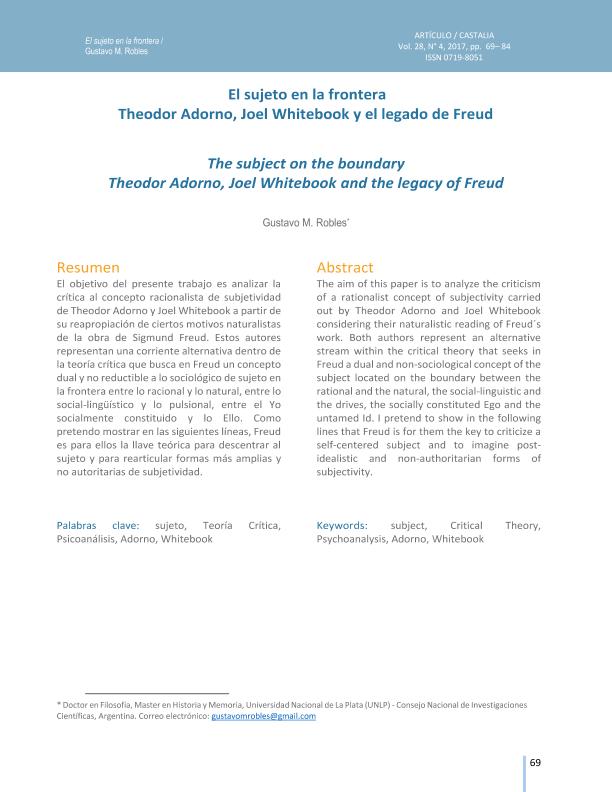Artículo
El objetivo del presente trabajo es analizar la crítica al concepto racionalista de subjetividad de Theodor Adorno y Joel Whitebook a partir de su reapropiación de ciertos motivos naturalistas de la obra de Sigmund Freud. Estos autores representan una corriente alternativa dentro de la teoría crítica que busca en Freud un concepto dual y no reductible a lo sociológico de sujeto en la frontera entre lo racional y lo natural, entre lo social-lingüístico y lo pulsional, entre el Yo socialmente constituido y lo Ello. Como pretendo mostrar en las siguientes líneas, Freud es para ellos la llave teórica para descentrar al sujeto y para rearticular formas más amplias y no autoritarias de subjetividad. The aim of this paper is to analyze the criticism of a rationalist concept of subjectivity carried out by Theodor Adorno and Joel Whitebook considering their naturalistic reading of Freud ́s work. Both authors represent an alternative stream within the critical theory that seeks in Freud a dual and non-sociological concept of the subject located on the boundary between the rational and the natural, the social-linguistic and the drives, the socially constituted Ego and the untamed Id. I pretend to show in the following lines that Freud is for them the key to criticize a self-centered subject and to imagine post-idealistic and non-authoritarian forms of subjectivity
El sujeto en la frontera : Theodor Adorno, Joel Whitebook y el legado de Freud
Título:
The subject on the boundary : Theodor Adorno, Joel Whitebool and the legacy of Freud
Fecha de publicación:
09/2017
Editorial:
Universidad Academia del Humanismo Cristiano. Escuela de Psicología
Revista:
Castalia
ISSN:
0719-8051
Idioma:
Español
Tipo de recurso:
Artículo publicado
Clasificación temática:
Resumen
Palabras clave:
Sujeto
,
Teoria Critica
,
Psicoanalisis
,
Adorno
,
Whitebook
Archivos asociados
Licencia
Identificadores
Colecciones
Articulos(IDIHCS)
Articulos de INST.DE INVEST.EN HUMANIDADES Y CS SOCIALES
Articulos de INST.DE INVEST.EN HUMANIDADES Y CS SOCIALES
Citación
Robles, Gustavo Matías; El sujeto en la frontera : Theodor Adorno, Joel Whitebook y el legado de Freud; Universidad Academia del Humanismo Cristiano. Escuela de Psicología; Castalia; 28; 4; 9-2017; 1-18
Compartir
Altmétricas




